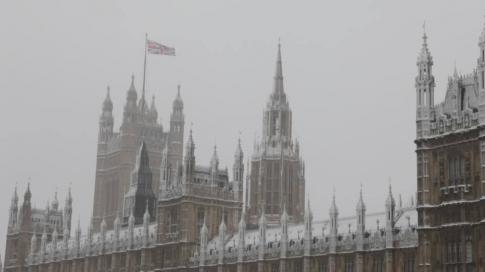Brexit

Another Brexit crunch week, what could happen?
With MPs due to vote on May’s deal a third time, here are four scenarios that might play out
After Theresa May’s deal was voted down for a second time last Tuesday, and with just days to go before EU leaders meet in Brussels to discuss a potential article 50 extension, this looks like yet another crunch week for Brexit. What could happen?
1. May’s deal scrapes over the line – short, ‘technical’ Brexit delay
The government’s deal was defeated at last week’s second meaningful vote by a majority of 149. That means she must convince 75 MPs to change sides if she is to win this week.
Ministers are negotiating with the Democratic Unionist party, in the hope its MPs could swing behind it. If they do, Downing Street believes a good chunk of the European Research Group could follow. And they hope that if the vote appears to be close, a few more Labour MPs from leave-voting seats could support it too.
There is also chatter at Westminster that the prime minister may be forced to offer a timetable for her own departure, in exchange for the support of some MPs.
If the deal passes, the government has said it would then request a short, “technical” extension to article 50 at Thursday’s European council meeting, to allow time for the requisite legislation to be passed.
Profile
Brexit no-deal vote: a brief timeline of chaos
Show
2. Deal falls – long extension
Sign up to our Brexit weekly briefing
Read more
May has said that, as last week’s government motion on delaying Brexit made clear, if parliament has not backed a deal, she expects EU leaders to insist on a long extension – perhaps of more than a year – to allow the UK to agree on a way forward.
In those circumstances, the government has promised to embark on a process of “indicative votes”, beginning on 25 March, to work out what alternative approach MPs could support.
Many at Westminster believe that would be likely to result in a closer future relationship with the EU, perhaps including a customs union. It might also allow the idea of cancelling Brexit to gain traction.
3. Parliament demands a referendum
Advertisement
Labour has suggested it would back an amendment to the meaningful vote motion tabled by a pair of MPs, Peter Kyle and Phil Wilson, that would see the Commons decline to support May’s deal until it is ratified by the public in a referendum.
If it passes, May’s deal would be put to a public vote – though that idea is far from universally popular even among some Labour frontbenchers – and the party would be likely to press for its own alternative proposal to be included on the ballot paper.
It is unclear whether the government would agree to implement such a referendum; or whether May, who has claimed another poll could threaten social cohesion, would rather resign, or trigger a general election. In any event, a significant delay to article 50 would be necessary, to allow a referendum to take place.
4. No-confidence vote
Jeremy Corbyn hinted on Sunday that Labour may be prepared to table a no-confidence vote in Theresa May’s government for a second time this week, if her deal is rejected.
She won the last one, in January, by 325 votes to 306; but some of the most vehement backers of a hard Brexit have hinted they could vote with Labour to bring down the government.
After a no-confidence vote, there would be a fortnight in which MPs could seek to form an alternative government. That could be led by Corbyn, if he was able to secure the backing of other parties; or even by a backbencher, if they could assemble a stable majority for a way through the Brexit crisis.
If no majority emerged, a general election would be called – and meanwhile the government would have had to request an extension to article 50, to allow time to find a way forward.




 del.icio.us
del.icio.us Digg
Digg

Post your comment